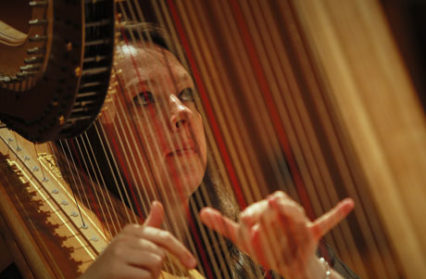The music of Morfydd Owen (1891-1918) first came to my attention in the dance piece I loved you and I loved you, a Sweetshop Revolution production in the Cardiff Dance Festival 2015. Her songs have long been familiar to singers competing in Welsh eisteddfodau, but there has been a wider revival of interest in her work in the past few years, mostly especially thanks to the scholarship of Dr Rhian Davies, Artistic Director of the Gregynog Festival. In 2018 she transformed the festival into a year-long series of events to commemorate the centenary of the composer’s early death. In a concert in the 2018 BBC Proms, Owen’s Nocturne (1913) was played by the BBC National Orchestra of Wales alongside works by Mendelssohn, Schumann and Lili Boulanger, where it shone in its brilliance.
Hopefully Owen’s work will now take its place in international concert repertoire. In a lunchtime concert put on by students of voice and harp at the RWCMD, it was interesting to hear some of her songs alongside those of fellow Welsh composers Dilys Elwyn-Edwards and Grace Williams.
Grace Williams (1906-1977) is often described as ‘Wales’s most notable female composer’, though if Morfydd Owen had lived she might well have eclipsed her. But ‘mights’ count for nothing, other than in speculative essays. As it was, Williams won the Morfydd Owen scholarship to Cardiff University in 1923 and three years later continued her studies with Gordon Jacob and Ralph Vaughan Williams at the Royal College of Music. Owen was at the Royal Academy and elected an Associate there not long before her untimely death in 1918. She studied there with Frederick Corder. Dilys Elwyn-Edwards (1918-2012) studied at the Royal College with Herbert Howells, who taught composition there over a period of nearly sixty years.
It is not surprising that these three composers, all taught by male English composers of the first half of the twentieth century, followed in their teachers’ pastoral musical footsteps. The programme of music in this concert certainly showcased the influence of nature on the Welsh women’s songs and music for harp, starting with the simple, affecting melody of Morfydd Owen’s Speedwell, from her four flower songs. It is good to see that TŷCerdd have produced new editions of the sheet music for these and several of Owen’s other English language songs, thus making them more widely accessible.
Grace Williams’s song output was represented in this programme by one short song, Slow, Slow Fresh Fount, a setting of words by Ben Jonson. In truth, song was less significant in her output than for the other two composers, though there are significant elements of song in her orchestral pieces. Most notably, her symphonic poem Penillion (1955) is said to translate into instrumental form the metrical and melodic characteristics of the Welsh song tradition of the same name or cerdd dant,in which the singer improvises a countermelody over a set melody played on the harp.
What was also included in this programme from Williams’s output, though, was her Hiraeth for solo harp. The instrument is supremely well suited to conveying the melancholy and longing of that peculiarly Welsh emotion. What were programmed as Morfydd Owen’s Three Welsh Improvisations for Solo Harp were – as their performer told us – actually written for piano. But the twin aims of this concert were clearly to showcase both the works of three Welsh women composers and the talents of voice and harp students, so given that Owen wrote nothing for solo harp the inclusion of transcriptions is understandable.
I enjoyed hearing songs by Morfydd Owen which were new to me, especially Yr Oenig(The Lamb), a sweetly elegiac setting of Blake’s words, but the revelatory glory of this programme for me was in the songs of Dilys Elwyn-Edwards. I loved in particular her Canueon y Tri Aderyn (Songs of the Three Birds) with their contrasting moods and the variety of timbres in the harp parts. Maybe the influence of Herbert Howells on both, as well as their shared ability to conjure a mood with controlled skill, but without a trace of ostentation, makes me think of Elwyn-Edwards’s songs and those of her near contemporary, the English composer Madeleine Dring (1923-1977), as having something in common. Both deserve to be heard much more.
Concerts at the RWCMD offer wonderful opportunities to hear both neglected repertoire and the professional musical performers of the future. All five singers and six harpists deserve good careers: I’ll be listening out in particular for more from the tenor Osian Bowen and the mezzo Eiry Price.
Cath Barton’s debut novella, The Plankton Collector, is published by New Welsh Review under their Rarebyte imprint.



 Enjoyed this article? Support our writers directly by buying them a coffee and clicking this link.
Enjoyed this article? Support our writers directly by buying them a coffee and clicking this link.







